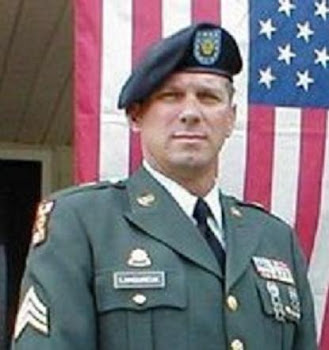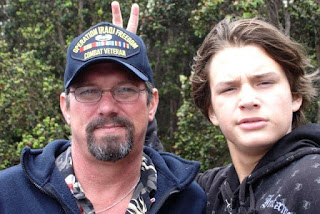THE SPOKES-MAN REVIEW
September 6, 2009 in Opinion
Build in care for veterans
By Jamie Tobias Neely
Former Marine Chad Olson listed his favorite book on his MySpace page. It was called “I Hope They Serve Beer in Hell.”
Last weekend Olson and his wife, Jessica Armstrong, both 21, died in his family home in Republic, Wash., each of a single gunshot wound.
The scene was such a mess that a Washington State Patrol spokesman late last week declined to speculate on the exact nature of the case.
Earlier that week, Ferry County authorities said it appeared to be a murder-suicide. And family members linked the deaths to Olson’s tour of duty in Iraq and the effects of post-traumatic stress disorder.
We protected Americans usually send our military men and women far away to fight our wars, content to clasp our hands over our hearts and ignore the distant carnage.
But those who live and work closely with returning veterans know that the violence and trauma of battle often follows them home. Here it may replay in endless, sleep-robbing loops, binding veterans in anxiety, anger and isolation. In a few cases, it even results in death.
Most of those cases are suicides. From July 2007 to the first week of July 2008, according to a recent internal investigation, at least 22 veterans killed themselves in the Spokane service area.
This internal investigation called for changes at the Spokane VA Medical Center, including better outreach to veterans of the Iraq and Afghanistan wars. It also called for recruiting more behavioral health staff, providing better screening, improving pain management and sharpening techniques for serving high-risk patients.
The military trains its service men and women to wrap themselves in an emotional invincibility. Later, when that false shield cracks under the trauma of war, they hesitate to speak up.
When it comes time to leave active duty, most are in a hurry to return home. Any briefings they receive about VA benefits can be quickly forgotten. Once they arrive back in Eastern Washington, veterans may melt into cities and rural areas without even considering a visit to the VA hospital. While worthwhile outreach programs exist, there has been no simple way to find every veteran who might need care.
If Chad Olson’s MySpace page can be believed, he was impressed by the Marine helicopter in which he flew, but his life appeared chaotic, derailed by a deeper fascination for alcohol. According to the Omak Chronicle, he recently was charged with second-degree burglary, third-degree malicious mischief and third-degree theft after a case of whiskey was stolen from a state liquor store.
A spokesman for the Spokane VA Medical Center says there is no record that Olson ever sought treatment from that facility.
But it appears that if he did suffer from PTSD, he also experienced complicating factors such as unemployment and substance abuse.
Research indicates that early interventions show the greatest promise of preventing long-term negative consequences of PTSD.
A Rand report last year described the potential risks of untreated PTSD: poor work performance, financial hardship, physical violence in the home, substance abuse, homelessness and higher rates of suicide, homicide and accidental death.
Because early intervention is so critical, it makes sense to register military members for Veterans Affairs care before their active duty status ends. They should automatically be scheduled for an appointment at their closest VA health care facility for physical and mental health screening within the first weeks of returning to civilian life.
Additional behavioral health staff members should be hired for the Spokane area and an inpatient program designed to treat both PTSD and substance abuse should be added.
Without peace, we’ll never entirely stop the reverberations of war from exploding in small towns like Republic. Mental health treatment can be highly effective, but it’s not magic.
As the White House deliberates this week about how many extra troops to send to Afghanistan, Americans are likely to hear platitudes about sacrifice and patriotism.
It’s doubtful we’ll stop to calculate the additional numbers of likely PTSD sufferers.
But whether we let the issue enter our consciousness or not, the wreckage of war will continue.
Last week it appeared to extend all the way north to Republic.
Jamie Tobias Neely is an assistant professor of journalism at Eastern Washington University. She may be reached at jamietobiasneely@ comcast.net




No comments:
Post a Comment